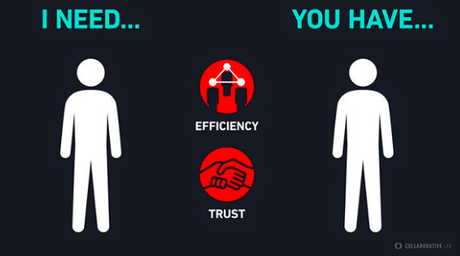 Sharing technology is all around us. Some well-known companies like Uber (get a ride) and AirBnB (get a room) have mastered it, providing utility and relevancy from their always-available apps. Note that now, though, there are sharing apps for more than just cars and beds. From food to friendship, we can get on-demand, geographically useful access to whatever we need, whenever we need it thanks to sharing technology.
Sharing technology is all around us. Some well-known companies like Uber (get a ride) and AirBnB (get a room) have mastered it, providing utility and relevancy from their always-available apps. Note that now, though, there are sharing apps for more than just cars and beds. From food to friendship, we can get on-demand, geographically useful access to whatever we need, whenever we need it thanks to sharing technology.
But all that just scratches the surface. What’s the lowdown on the sharing economy? What makes it tick? What keeps it growing? It turns out it has a lot to do with humans like you and me—oh, and a little thing called the cloud.
The Rise of the Sharing Economy
The sharing economy isn’t going anywhere—in fact, it’s the well-funded, well-loved technological offspring of consumerism’s social and entrepreneurial sides. While many companies within the sharing economy—also called the collaborative economy—are just coming into their own, they’re actually not new. VentureBeat reports that many of these startups took their first steps during the tough 2008 recession. Fast forward nearly eight years, and you’ll find they’re certainly not suffering: VentureBeat credits the sharing economy with birthing 17, billion-dollar companies, with 60,000 employees and $15 billion in funding (more than the entire social networking space) between them. It’s easy to see, then, why they say the sharing economy is “still in its infancy.”
Let’s explore the two-fold reason behind the boom: People and cloud technology.
The Human Factor
Of course there are all different types of consumers, but most of them could probably agree on some things: They enjoy connecting with others and are intrigued by tech gadgets and the latest apps. Can you guess their favorite thing? I can’t say for certain, but I imagine getting exactly what they want, whenever they want it, is pretty high on the list. Apps within the social economy allow this—many utilize your location to provide instant answers or service, and all it takes is a few smart phone swipes to get what you need conveniently and quickly.
Essentially, the human factor to the sharing economy exists because humans both consume the technology and fuel it. What makes it all possible? Let’s take a closer look at the role of cloud technology in this equation.
Powered by Cloud
Think of all the benefits cloud technology offers a traditional business—there’s streamlining processes, reducing in-house hardware and server costs, freeing up IT resources, enhancing project management and sharing capabilities (just to name a few). I could go on, but you get the idea. The cloud is an enterprise powerhouse, providing opportunities for companies to do in a few hours what would have taken week, pre-cloud, in terms of infrastructure and logistics. Now, let’s apply this obvious flexibility and utility to the sharing economy. The cloud has provided a technological movement that allows companies to quickly build sharing applications for mobile and desktop use with the leveraging of APIs.
Consider this example: Shrebo, a Switzerland-based company providing an entire web-services-based SaaS platform, allows users to share and gather metrics on analytical, booking, payment and social interaction data. Using shrebo, third parties can create sharing applications in local or mobile contexts, assist with logistical automation, improve asset optimization and more. In a nutshell, shrebo makes sure businesses get the most out of their resources (even down to the parking spaces) and provides the metrics to back it up—a social economy asset brought to you by the cloud.
An Equation for Innovation
We know that people are the force behind the utilization of sharing economy apps. It’s also true that the growth of cloud, mobile, and API utilization is leading to so many more options and applications for sharing economy app users. It only follows then, that the cloud-powered sharing economy will continue to explode into the future as computing power, mobility, and user experience dominance lead to more apps, both competitive and greenfield. How do you interface with the sharing economy? How big of a role do you think cloud technology plays in your go-to apps? Do you think there is a way your company can capitalize on the forward motion of the sharing economy and cloud technology, if you haven’t already? I’d love to hear your thoughts and experiences.
Additional Resources on this Topic:
Pop-Up Restaurant in Amsterdam is Fueled by the Sharing Economy
Will the Collaborative Economy Completely Reimagine Tomorrow’s Big Business
Redefining Property: The Sharing Economy
This post was written as part of the Dell Insight Partners program, which provides news and analysis about the evolving world of tech. For more on these topics, visit Dell’s thought leadership site Power More. Dell sponsored this article, but the opinions are my own and don’t necessarily represent Dell’s positions or strategies.
Photo Credit: Minh Q. Tran via Compfight cc
This article has been published on MillennialCEO.
